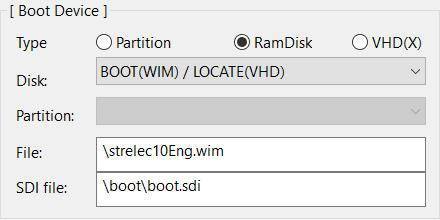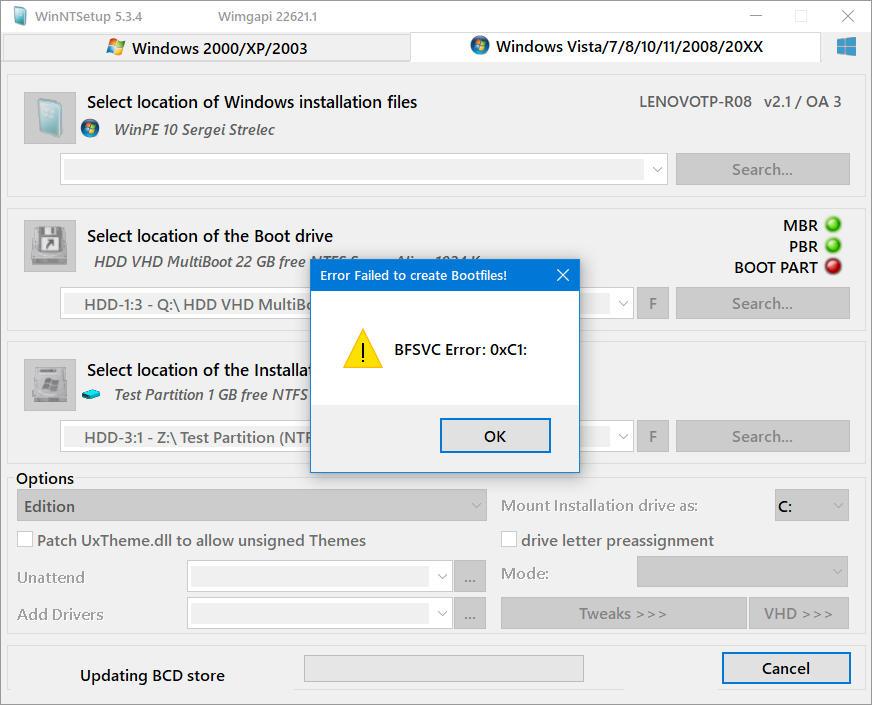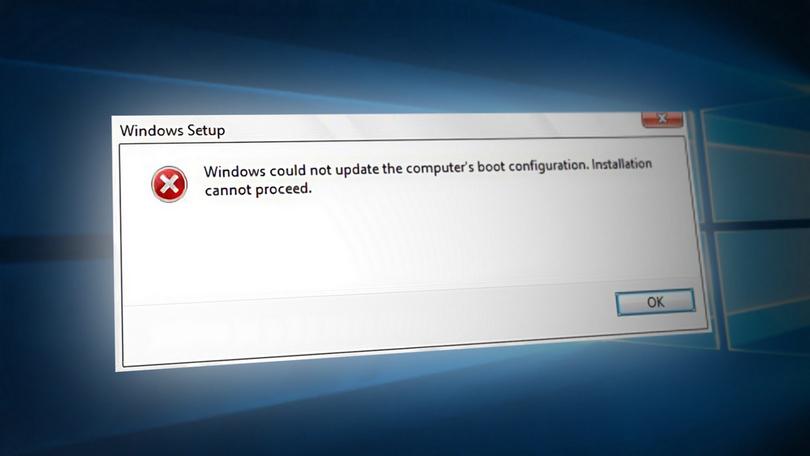Content Type
Profiles
Forums
Events
Everything posted by click-click
-

Editing an Offline Registry with RunScanner
click-click replied to click-click's topic in Install Windows from USB
Seems to be working again after several LCU updates. Also added /XS parameter to runscanner. -
Do you happen to know the bcdedit commands needed to do this? I'm unsure how to add a PE wim file so it will boot. I have a partition for booting different vhds. Do I update the bcd from there to add the wim? Edit: OK, got it to work. I was missing the boot.sdi.
-
I am trying to convert a wim to vhd and get the following error after I had manually applied the wim to the vhd with dism /apply-image /imagefile:Q:\strelec10Eng.wim /index:1 /applydir:z:\. What does the error mean and can it be fixed?
-
@JFX Well, whatever it was, I can't recreate the problem above right now. Things are working again. It may have been caused because I renamed an OS Title that appears in the boot selection menu. I want to keep a test VHD that always shows the same name in the boot menu no matter what OS gets installed in it, but Winntsetup always uses the name from the OS in the image when it updates the BCD for that VHD. Is there a way to tell WinntSetup to use a different name for the OS Title?
-
Single partition only for vhd. Boot drive Q: Install partition (vhd) Z::
-
I've never had this problem before when applying an image with Winntsetup to a partition or a vhd, but now I'm having a problem applying to a vhd. When I boot the image, I get the following msg after the installing devices phase: The apply image is not broken because it installs fine to a partition. What could be the problem with the install to vhd and how to fix?
-
How would you disable that policy in the image or during install, without registry?
-
is there any way to disable 'Passwords must meet complexity requirements' in the security policy when the image is applied with winnrsetup? I can't seem to find a reg hack for that. I only managed to change it online via secpol.msc
-
I just noticed that the bcdedit included in the WinNTSetup Tools directory has an invalid signature. What is the difference between that and the bcdedit in \system32 and why is it even included?
-
I finally have a single Win2Go flash that will boot on either Legacy BIOS or UEFI hardware. My problems started because I was on Win8 when I tried this. Win8 would not recognize the 2nd partition. On Win10 things went better, but I ended up with a blinking cursor in legacy mode. When I selected the boot drive with Winntsetup, I noticed that the MBR was yellow so I re-did the flash partitions with Bootice which made MBR PBr and Boot partition show up green. I then updated the bootfiles and BCD with Winntsetup. This fixed everything except for the bootmgr menu not showing in UEFI mode. I have 2 VHDs on the 2nd partiton so I can choose either W10 or W11 for booting. BIOS mode shows the bootmgr menu whereas UEFI mode didn't. I fixed this by selecting the checkbox 'display boot menu' in the UEFI BCD. I did not have to do this with the Legacy BCD, so I have no clue why UEFI does not automatically show the boot menu when the UEFI BCD has 2 boot entries listed.
-
The fat32 solution works fine for booting in UEFI mode with the vhd on the 2nd partition. The problem now, is that BIOS mode boot ends up with a blinking cursor because it can't find the vhd on the 2nd partition. If I use Bootice to make the 2nd partition accessible, my bootmanager (BIBM) will see it and I can boot the vhd in BIOS mode. Making the 2nd partition accessible with bootice doesn't have any affect on a native boot which reverts to using the fat32 partition and only seems to support UEFI mode when using 2 partitions (Fat/ntfs) on a USB flash. A fix for the blinking cursor and still have everything work would be the icing on the cake. BTW, using my setup above, WinNtsetup got an error trying to mount the vhd from the 2nd partition when I specify the first partition as the boot drive. I had to manually mount it as the install drive with diskpart so setup could copy the boot files and create the correct BCDs. Seems to be okay now after a few other attach attempts. Another thing I noticed is that even though UEFI boot boots the vhd from the NTFS partition, it can't find any BCD when running BCDEdit . Both partitions were updated with the required boot files and BCDs via WinNTSetup. In BIOS boot (legacy) mode the BCD is found.
-
If I do that and and try to create another partition, Windows will only recognize the first partition because it sees the flash as a removable disk. Is there a way arround this? Edit: I found a way to create the 2nd partition with a drive letter on W10, but on Win8 the 2nd partition is not recognized, only the first. Still testing though. If I put a vhd on the other partition, Winntsetup is unable to mount it
-
I tried to install windows on a usb fat32 partition with Wintsetup and it says installation drive invalid! Please choose a NTFS drive. Is this not supposed to work?
-
Is formatting with FAT32 the only solution to make a singe USB flash support booting with pure uefi systems and with legacy BIOS systems?
-
yes, the flash is formatted ntfs, How would I start the loader manually: \EFI\Boot\bootx64.efi from the flash?
-
I'm still somewhat confused how the BIOS option ALL in WinNTSetup is supposed to work. When I boot a VHD from a USB stick and run powershell $env:firmware_type It always returns 'Legacy' when running on my Thinkpad that has CSM support for both UEFI and BIOS. Apparently setting ALL still boots in BIOS mode. If I set the BIOS for the Thinkpad to UEFI only, the VHD won't boot. What else needs to be done or toggled with WinNTSetup so either mode for booting will work?
-
FYI: I ended up using Hasleo Disk Clone portable to copy partition to vhd which took about 5 min compared to the 19 by wimlib as previously stated.
-
Good find. I can leave everything as is and use bootems (Yes/No) to toggle the menu as needed. Thanks ...
-
I understand what you are saying. If I leave the BCD the way it is, shouldn't the boot disk be showing the standard boot menu instead of the legacy one? How would I get the standard boot menu back?
-
Note: the legacy menu replaced the standard after adding Win7 to the BCD via WinNTSetup. It stayed enabled after deleting the Win7 entry with Bootice. bcd.txt
-
Ok, I'm using native boot for VHD. Do you know why the legacy boot selection menu is used when booting from the physical disk's boot partition and how is this related to the individual application objects that don't show legacy? Just trying to understand
-
OK, I missed it in professional mode. All entries are standard, but when I boot from the volume, I get the legacy menu which I want, but this only happened after adding a Win7 VHD to the BCD via WinNTSetup (no install media, boot drive, VHD install drive). I deleted the Win7 entry later from the BCD and booting still uses legacy. I don't see legacy in any of the elements. If I add a Win8 VHD via WinNTSetup as I did for Win7, the boot menu goes back to standard. This is what I want to avoid. I'm having a hard time understanding the uses of the volume BCD and the BCD within the VHD.
-
Sorry, I must be blind, but I don't see anything in Bootice where to set the BootMenuPolicy to legacy
-
I am using Windows Boot Manager for booting VHDs. The new Boot Manager from W8 onward has the disadvantage in that it does an additional reboot when selecting an entry following the 1st one from the list. How do I replace the boot manager on the drive containing the VHDs with the one from W7 which boots any entry directly without an additional reboot?
-
Sorry, I was using a batch file to create the vhdx and to do the Wincopy. As it turns out I did not consider diskpart not finishing its' script if it could not create the vdisk. This was causing the wimlib error because nothing got mounted by diskpart. I finally got it working by deleting the vhdx before running the batch, but the copy takes extremely long to finish. 19 min. compared to 7 min. doing a restore.




